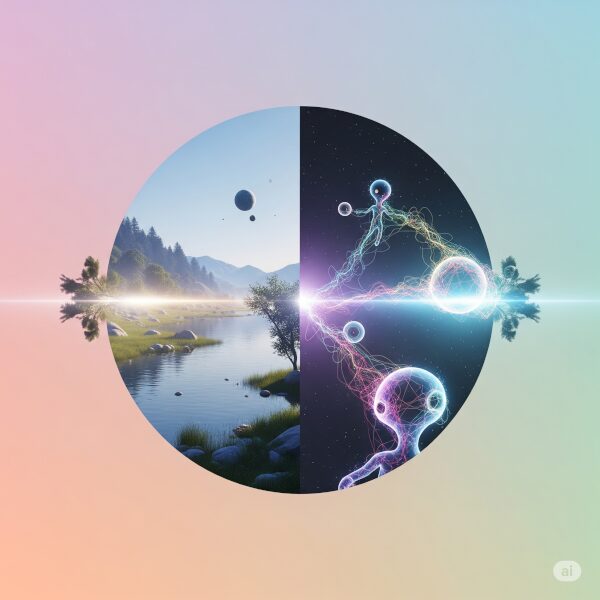Cosmic Crisis
What if Two Universes Collided?
A Universe Apart: An Introduction to The Gods Themselves
- A Universe Apart: An Introduction to The Gods Themselves
- Unveiling the Cosmic Crisis: What’s All the Fuss About?
- A Glimpse into Alien Worlds: Exploring the Unfathomable
- Cast of Characters: The Minds Behind the Cosmic Crisis
- The Publishers and the Ponderings: The Legacy of Asimov’s Work
- Echoes in Our Time: Science, Ethics, and AI
- Wrapping Up Our Cosmic Meanderings: A Personal Farewell
Oh, hello there, darling! Do come in, and make yourself comfortable. Here in Abiko, one often finds oneself with a quiet moment, perfect for delving into something truly cosmic. Today, I thought we might chat about a rather fascinating little book by the venerable Isaac Asimov: The Gods Themselves. Now, if you’re not entirely familiar, it’s a tale that gracefully weaves together two vastly different universes, and the thorny, exquisite ethical predicaments that arise when their paths, shall we say, inevitably converge. It’s a bit of a brain-tickler, I assure you, and certainly one that has stayed with me since I first picked it up. A truly thought-provoking read, if ever there was one.
Unveiling the Cosmic Crisis: What’s All the Fuss About?
Now, you might be wondering, “Sophia, what precisely is this Cosmic Crisis you speak of?” Well, imagine, if you will, two parallel universes, utterly distinct yet unknowingly intertwined. One is our familiar, comfortable universe—brimming with curious minds and the restless pursuit of knowledge. The other? A truly alien existence, inhabited by beings of pure energy, living in a realm governed by different physical laws. Asimov, with his characteristic genius, proposes a “para-universe” – a place where the strong nuclear force behaves differently. This seemingly innocuous difference allows for the creation of an “electron pump,” a device that generates immense energy by exchanging matter between the two universes. It sounds dreadfully complicated, doesn’t it? But Asimov, bless his heart, explains it with such elegance that even I, with my rather rudimentary grasp of theoretical physics, found myself nodding along. It’s a delicate dance between scientific marvel and potential catastrophe, a Cosmic Crisis waiting to unfold, all wrapped up in a story that’s far more engaging than a textbook.
A Glimpse into Alien Worlds: Exploring the Unfathomable
Ah, the realms within The Gods Themselves—extraordinary hardly begins to describe them. Our own universe, of course, is rather familiar, but it’s the para-universe that truly sparks the imagination. Picture a world where beings exist not as solid forms, but as entities of energy, communicating through electromagnetic fields, experiencing emotions as shifts in their very being. They live in a hierarchical society, divided into “Emotionals,” “Parentals,” and “Rationals,” each with a distinct role in their communal existence. If I were to live there, I imagine I’d be an Emotional, rather flitting about with delightful bursts of light, perhaps trying to organise a little tea party for the Rationals, who seem frightfully busy with their logical deliberations. It’s a world built on fundamentally different principles, and the notion of these two disparate realities interacting is where the genuine Cosmic Crisis truly begins to simmer. It’s a testament to Asimov’s boundless creativity, crafting a universe that feels both utterly alien and strangely plausible.
Cast of Characters: The Minds Behind the Cosmic Crisis
Now, every good story needs its players, doesn’t it? In The Gods Themselves, Asimov presents us with a captivating ensemble. We have Frederick Hallam, the brilliant but rather overshadowed scientist who stumbles upon the electron pump’s secrets. Then there’s Peter Lamont, the idealistic young physicist who becomes increasingly concerned about the long-term implications of this cross-universe energy exchange. And on the other side of the veil, in the para-universe, we meet the fascinating, and utterly alien, creatures. There’s Dua, an Emotional who quietly rebels against the emotional confines of her assigned role, and Odeen, a Rational grappling with the ethical dimensions of their own scientific pursuits. If Dua and I were chums, I imagine we’d be gossiping about the latest scientific breakthroughs, and I’d gently tease her about her emotional outbursts. Lamont, I think, would be the kind of person you’d enjoy a quiet cup of tea with, discussing the profound implications of discovery. Every character—human or otherwise—serves to weave the complex ethical fabric at the heart of this Cosmic Crisis, leaving you to quietly ponder the fragile weight of wisdom in curious hands.
The Publishers and the Ponderings: The Legacy of Asimov’s Work
The Gods Themselves, originally published in 1972, first graced the pages thanks to Doubleday. They’ve always had a keen eye for quality, haven’t they? This novel, a standout among Asimov’s extensive bibliography, even snagged the prestigious Hugo Award and Nebula Award, which, let’s be honest, is no small feat! It stands as a testament to its enduring impact on the science fiction landscape. While it hasn’t seen a direct film adaptation (a great shame, I think, as it would be visually spectacular!), its themes of interdimensional travel, scientific ethics, and humanity’s potential for both brilliance and folly have echoed through countless other works. One can see its influence, subtly woven, in stories that explore the delicate balance of power and the unforeseen consequences of innovation. It truly cemented Asimov’s reputation not just as a master storyteller, but as a prescient voice on the challenges presented by scientific advancement.

Echoes in Our Time: Science, Ethics, and AI
In today’s world, where artificial intelligence, climate change, and interconnectivity present both promise and peril, Asimov’s ethical dilemmas around unchecked innovation feel more prescient than ever. Are we, like Hallam or Dua, rushing towards discovery while forgetting the cost? The energy exchange in The Gods Themselves resonates uncannily with our own global energy crisis, prompting us to consider the long-term impacts of our technological pursuits. It’s a powerful reminder that even the most brilliant scientific breakthroughs demand careful ethical consideration.
Wrapping Up Our Cosmic Meanderings: A Personal Farewell
Well, my dears, we’ve had quite the little journey through The Gods Themselves, haven’t we? It’s a book that truly encapsulates a Cosmic Crisis, a delightful and sometimes chilling exploration of what happens when scientific ambition outpaces ethical foresight. It prompts us to consider the grand implications of our discoveries, and the responsibility we bear not just for ourselves, but for all life, even those we can barely comprehend. Remember, everything I’ve shared with you today is, of course, simply my own rather whimsical take on this marvellous book.
Have you read The Gods Themselves? Or perhaps another tale where science courts disaster? Do share your musings below—Sophia is always delighted to converse.
But I do hope I’ve piqued your interest enough to perhaps pick up a copy yourself. It’s a rare gem that truly makes you think, and what more could one ask for from a good book? Next time, we might peer into the crystalline future of Arthur C. Clarke, or perhaps tumble into the paradoxes of Le Guin’s The Dispossessed—do stay tuned.





Leave a Reply